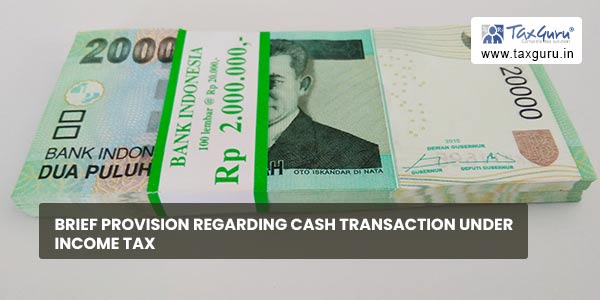After the demonetization of currency, the government was aiming to regularize the cash transaction and therefore they have come with various provisions to discourage such transactions. Following are various provision brought to Income tax law 1961 and other laws in simple language –
1. SECTION 40A(3) – Payment or aggregate of payments is made to a Person in a single day in cash in excess of Rs 10,000 otherwise than by an Account payee cheque or account payee demand draft or use of electronic System. For payments made to a transporter, the law provides for a higher threshold of Rs. 35,000/- If it exceeds Rs 10,000 or 35,000 as the case may be, such expenses are wholly disallowed.
2. SECTION 40A(2) – If payment is made to a Specified person (Example – Relative of individual, Director of company) so much of the Expenditure as is considered to be excessive & unreasonable shall be Disallowed by the AO.
3. SECTION 269ST – A person cannot receive an amount of Rs 2,00,000 or More from a person (Except Government or Bank) in a day, a single transaction, otherwise by an account Payee cheque or account payee DD or use of electronic system. Penalty for Non-Compliance, a sum equal to the amount of such receipt.
4. SECTION 43(1) – Disallowance of Depreciation – Expenditure for acquisition of any asset for which payment has been made to a person in a single day in cash exceeds of Rs 10,000. If it exceeds Rs 10,000 then depreciation not allowed on it.
5. SECTION 80D(2B) If payment of health insurance premium Made in cash then such amount is not allowed as deduction.
6. SECTION 80G(5D) Any payment for donation in excess of Rs 2,000 in cash is not allowed as deduction from Gross total Income.
7. SECTION 80GGA(2A) Any payment for Scientific research or Rural Development (section 80GGA) in excess of Rs 10,000 is not allowable.
8. SECTION (80GGB & 80GGC) No deduction for payment to political parties if Payment made in cash.
9. SECTION 194N TDS@2% on cash withdrawal above 1 crore from bank, Co-operative bank or post office. Limit has to checked for each bank separately. However, the limit shall be Rs 20 lac in case the person has not filed his last three years return of income. TDS rate in case of non-filler shall be 2% from Rs 20 lac to Rs 1 crore and 5% above Rs 1 crore.
10. SECTION 44AB(a) Increase limit of Tax Audit from 5 to 10 cr. if-
(a) All cash receipt not exceed 5% of total receipt
(b) All cash payment does not exceed 5% of total payment.
11. SECTION 269SS No person can accept any loan or deposit or specified sum of Rs 20,000 or more otherwise than by way of an account payee cheque or account payee draft or use of electronic clearing system through a bank account. In case of violation of it penalty u/s. 271D of Income tax act 1961 shall be levied equivalent to the amount of such loan or deposit or specified sum, so taken or accepted.
12. SECTION 269T It prohibits any person to repay the loan or deposit or specified sum otherwise than by an account payee cheque or account payee bank draft or by use of electronic clearing system through a bank account, if –
- Amount of loan or deposit, including interest amount, is Rs. 20,000 or more, or
- The aggregate amount of loans or deposits, including the interest amount, held by such person in his own name, or jointly with any person, is Rs. 20,000 or more.
In case of violation of its penalty u/s. 271E of Income tax act 1961 shall be levied equivalent to the amount of such loan or deposit repaid.

13. Saving account & Current account
Saving A/c – CBDT has made it mandatory for a bank or a cooperative bank to report cash deposits aggregating to Rs 10 lakh or more during a financial year, in one or more accounts (other than a current account and time deposit) of a person.
Cash deposit in FD: The Central Board of Direct Taxes (CBDT) has said that banks have to report if a person deposits in one or more-time deposits (other than a time deposit made through renewal of another time deposit) an amount aggregating to Rs 10 lakh or more in a financial year.
Current A/c – Current account holders have a cash deposit limit of ₹50 lakhs. Violation of this limit may garner the attention of the IT Department, and you may face a notice.
14. Cash withdrawal limit from bank and post office withdrawal limit at Post Office is ₹20,000 per customer.
No branch postmaster (BPM) shall accept cash deposit transaction for more than ₹50,000 in an account in a day.
No cash transaction for more than ₹50,000 shall be allowed at other SOLs in an account in a day.
For savings account maintained at a post office, the minimum required amount that needs to be maintained is ₹500 and if the minimum criteria are not met, ₹100 shall be deducted as an account maintenance fee.
15. Credit card bill payments – Payments made of an amount aggregating to Rs 1 lakh or more in cash towards credit card dues will have to be reported, says CBDT. Further, if one pays Rs 10 lakh or more to settle credit card dues in a financial year (via any mode), these transactions will also have to be reported to the tax department.
16. TCS provisions on transaction involving cash – In following cash transaction case TCS shall be deducted –
i. Providing any services whose receipt is in cash exceeding Rs. 2 lakhs (other than those services for which TDS is deductible under any section)
ii. Sale in cash of bullion exceeding Rs. 2 lakh and jewellery exceeding 5 lakh rupees.
iii. Sale of motor vehicle exceeding Rs. 10,00,000 in cash or any other mode.






Thank you so much sir, this was really very helpful as it summarizes all cash related transaction at one place.